Growing Together
article
Collection
Course
Growing Together: How the Food Industry Can Support the American Farmer
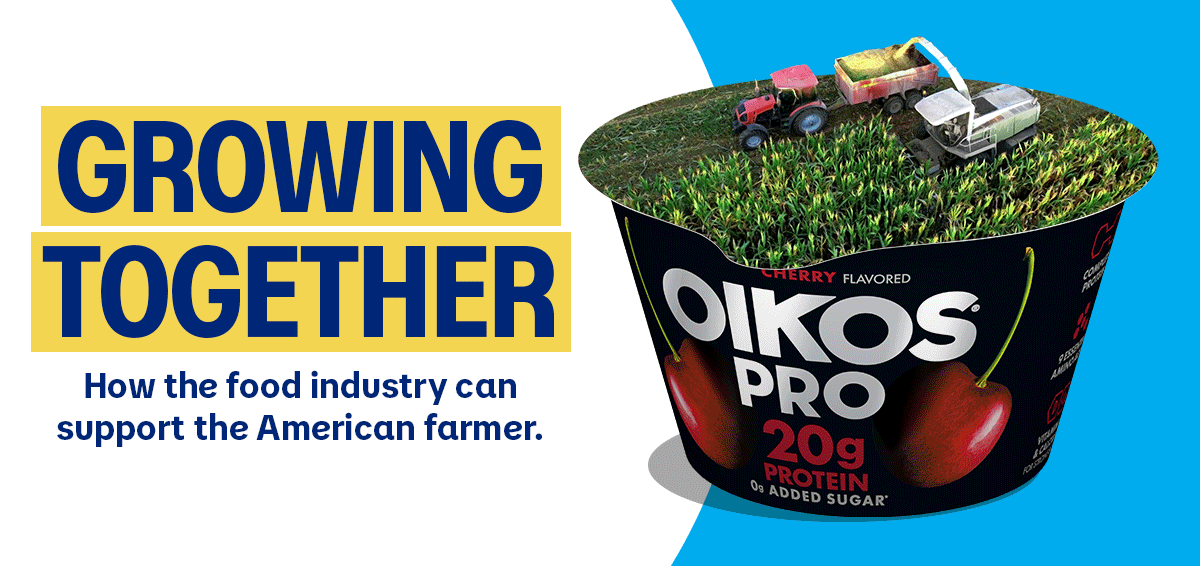

In America, supporting farms means supporting families. 96% of U.S.-based farms are family-operated, as farmers pass down wisdom and practices through the generations. But right now, the future of farming hinges on a complex challenge. The average age of farm producers has been creeping upwards for years, which, combined with degrading natural resources and a growing world population, could threaten our food system as we know it.
At Danone North America, we know firsthand how vital family farms are. We’ve spent years nurturing personal, long-term relationships with more than 50 of our farm partners across the country, investing close to $35M with these American farmers over the past five years alone. We also buy 90% of our ingredients and packaging materials here in the U.S., including approximately 2 billion pounds of milk from local dairy farms — many of which are family run. This makes us one of the biggest purchasers of milk in the U.S.
Because agriculture lies at the heart of our business, we’re leading the way to fortify its future. In 2017, we became one of the first food and beverage companies to adopt and scale a regenerative agriculture program — designed to help ensure our farm partners’ longevity and improve energy efficiency in the process. Just like our farm partners, we’re focused on protecting our natural resources and preparing the next generation of farmers for the long haul.
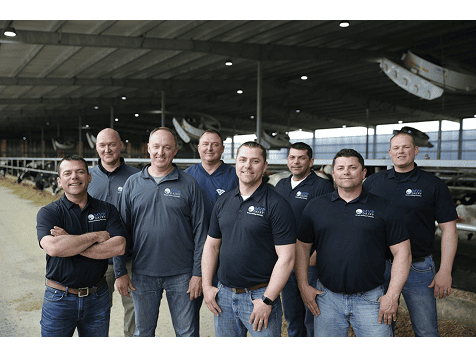
Danone Farm Partners - the McCarty & VanTilburg Families
Danone North America is invested in our farm partners’ livelihoods, and that work begins by ensuring that their businesses are built for long-term success.
Regenerative agriculture can help secure our natural resources for future generations, but it’s also good for business in the present. As part of our regenerative agriculture program, we conduct profitability analyses so that our farm partners can see the potential return on investment firsthand. At the same time, we collaborate with these businesses to help address production costs so they can make a profit and share regenerative farming practices to ensure their longevity.
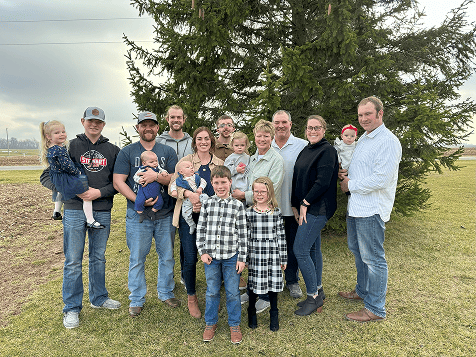
Danone Farm Partners – the Schwieterman Family
As crucial as these initiatives are, planning a multi-generational business also means supporting young leaders as they prepare to take the reins. That’s why we’ve created programs specifically designed to help farmers hand down their businesses with confidence. Danone’s Farm Credit Partnerships provide direct support for that process, as well as technical assistance designed to improve profitability, and our Farm Transition Planning helps oversee and support ownership and management transfers.
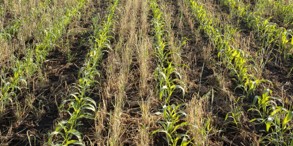
Reduced or No Till
Soil is a living, irreplaceable resource. Our farmers rely on it to grow our crops, feed our livestock, and nourish our families. But right now, this life-giving miracle is in jeopardy.
In 2023, researchers determined that soil in the midwestern U.S. is eroding 10 to 1,000 times faster than it forms — which costs the U.S. billions every year. Danone’s regenerative agriculture program first began with pioneering soil health research to help our farm partners care for their land and support their communities while maximizing their return on investment.
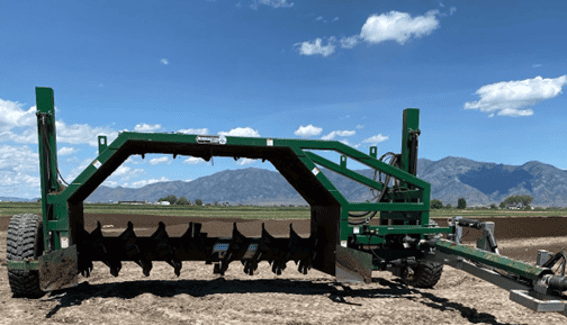
Compost Turner and Tractor
Preserving our soil is a vital step toward ensuring the resilience of farms, as well as our food system at large. By working with Danone to incorporate regenerative agricultural practices and equipment upgrades, our farm partners have increased their yields, curbed erosion, enhanced carbon storage, and conserved water. These proven methods actually help regenerate the soil, which helps to ensure we have this valuable natural resource available for future generations.
Reducing methane is crucial to ensure the resilience of our farms, and Danone’s regenerative agriculture program aims to do just that.
Key benchmarks include:
In 2024, we invested into 100 regenerative agriculture projects with more than 30 farming partners. This includes equipment like LED lights, fan upgrades, variable frequency drive pumps, solar panels, and Monarch electric tractors, all of which promote energy efficiency and reduce carbon emissions.
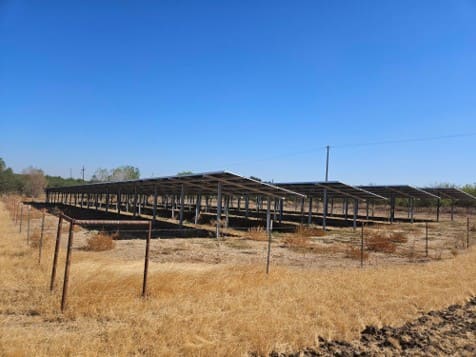
Solar Panels
Schwieterman Farms’ Mitch Schwieterman has said, “The Danone regenerative agriculture program is very proactive in helping figure out what fits each farm. We wouldn’t be where we are today without it.”
Danone also recently signed a multi-year contract with Leprino Foods aiming to reduce on-farm emissions by approximately 50% from 2020 levels by 2030. As part of this pioneering contract, the companies will install a BioFiltro wastewater treatment unit on a California farm — harnessing the natural power of earthworms to help prevent methane emissions in manure storages, with an estimated annual reduction 40,000 tons.
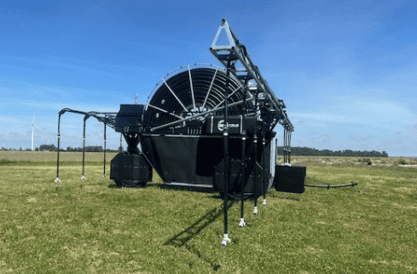
Rain360
Freshwater is a vital but finite resource. Shortages and contamination can pose significant threats to agricultural yields and the food supply. That’s why Danone is taking strategic measures to reduce our water footprint.
One part of this effort is gathering more accurate data to better gauge our resources. In 2023, we installed 129 soil moisture probes to help our farm partners monitor their water supplies. Additional initiatives vary by farm, and they’re all designed to conserve our natural resources and increase efficiency. For example, we’ve helped update certain suppliers’ irrigation systems to more efficiently use lagoon water — improving crop health while reducing their use of commercial fertilizers.

Irrigation Upgrades
Some of our partners, like Indian Stone Dairy, have installed smart cow sprinklers, which only activate when a cow is present for cooling, to conserve water while promoting herd health. Other farms, like GreenTop Acres, have installed an autonomous manure and irrigation applicator called Rain 360 to increase crop production, reduce commercial fertilizer use, curb methane production, and improve resilience against drought. Over a period of one to two years, Rain 360 can save an estimated 1,000 to 1,200 tons of carbon — helping protect our atmosphere from further erosion.
GreenTop Owner Trent Stoller has seen the results firsthand. “This equipment allows us the ability to spoon feed the crops,” Stoller says, “reducing risk of leaching and improving the use of nutrients.”
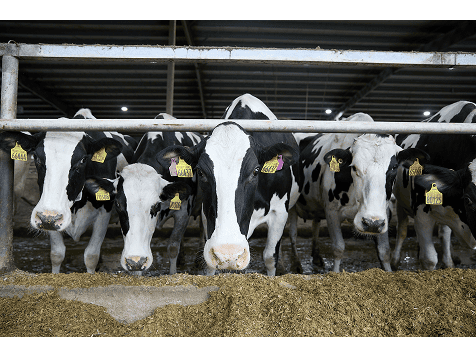
Cows at McCarty Farm
Without cows, there would be no milk, and therefore no yogurt. Through the years, we’ve helped our dairy farmers improve herd health and happiness by installing new equipment like cow brushes, scratch pads, and enrichment items. Our dairies have also installed wildlife boxes to support creatures like birds, bats, and bees — promoting biodiversity and pollination.
Technology has a role to play here, too. Our dairy farmers have leveraged new innovations like smart soakers, the ParlorBoss cow monitoring system, and AfiCollars to help improve energy efficiency and reduce labor demands while helping ensure cows’ health and safety. Since implementing AfiCollars, our farm partner Ambia Dairy has observed improved reproduction rates within its herd. Meanwhile, Freeland Dairy chose to upgrade its plate cooler — which reduced energy costs by up to 50%.
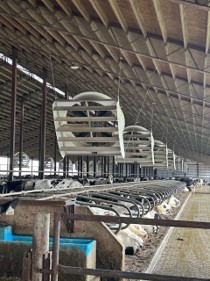
Cow Fan Upgrades
John Boreman, General Manager, Benton Group Dairies, knows that energy efficiency and animal welfare can go hand in hand: “Our farming families are dedicated to sustainable practices that nurture our community, care for our cows, and empower our growers to implement vital conservation practices. Together, we are cultivating a resilient future through regenerative agriculture.”
The road toward a more resilient planet will be long and full of challenges, but at Danone, we’re doing our part to ensure an abundant future for all.